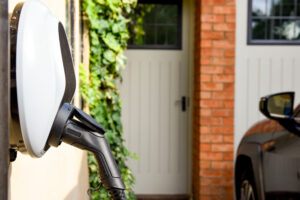In Delaware last week, the House passed a bill that would require newly constructed single-family and multi-family residential dwellings to include infrastructure for charging electric vehicles.
Senate Bill 103 would position the state for 2040, when researchers predict EV sales will outnumber those of traditional, internal combustion engine (ICE) vehicles, according to a House news release. The Senate passed the bill in May.
If signed by Gov. John Carney, the bill would also:
-
- “Provide county and municipal government enforcement of the electric vehicle charging infrastructure requirements;
- “Apply to the construction of a multi-family residential dwelling for which an application for final site plan approval is submitted on or after Jan. 1, 2025; and
- “Clarify that if the single-family residential dwelling does not have an attached or detached garage, an electric vehicle capable parking space must be provided in the driveway, assigned parking space for the dwelling, or at an unassigned non-street residential parking space constructed as part of the project.”
“Major vehicle manufacturers are pledging to go all-electric and we need to take the step to ensure that we’ve got the appropriate electrical charging infrastructure in place,” said Rep. Krista Griffith (D-Fairfax), co-sponsor of the bill. “As with anything, installation is more cost-effective during initial construction than the alternatives of retrofitting after the fact. This bill will make it easier and more convenient to own an electric vehicle for all Delawareans in the years to come.
“When we can be proactive and make it easier and more appealing for people to own electric vehicles, we should. We’re also promoting cleaner air and water, resulting in improved health outcomes for everyone as we’re able to reduce the amount of carbon emissions.”
SB 103(S) is one of several environmental bills passed during the current legislative session aimed at reducing the state’s carbon emissions, including House Bill 99.
“The 152nd General Assembly has demonstrated a strong commitment to passing bold environmental legislation. Senate Bill 103 builds on our efforts to transition Delaware to a more energy-efficient state by making it easier for consumers to purchase and maintain an electric vehicle by ensuring that all new home and apartment building in our state is ready for EV charging,” said Sen. Sarah McBride (D-Wilmington), bill co-sponsor. “I thank my colleagues in the House of Representatives for passing this legislation and look forward to the Governor signing it into law.”
Another bill passed by the legislature, House Bill 12, would codify the state’s Clean Vehicle Rebate program and allow up to a $2,500 rebate for EVs as well as a maximum of $1,000 for hybrid vehicles that retail up to $50,000. It’s awaiting Carney’s signature to become law.

